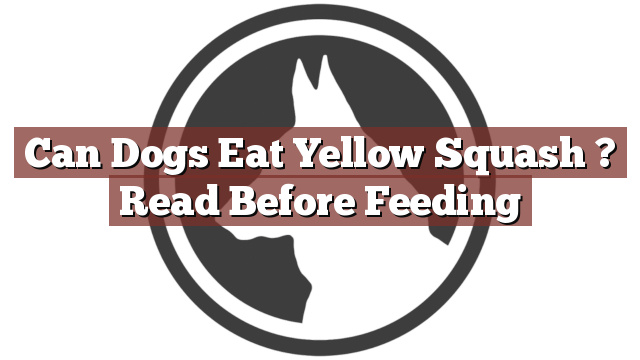Understanding Your Dog’s Dietary Needs
As a responsible dog owner, it’s important to understand your furry friend’s dietary needs. While dogs primarily thrive on a diet that includes meat and vegetables, there are certain fruits and vegetables that can be beneficial for their health. However, it’s crucial to be cautious and well-informed before introducing any new food into their diet. One such vegetable that dog owners often wonder about is yellow squash. So, can dogs eat yellow squash? Let’s find out.
Can Dogs Eat Yellow Squash? Read Before Feeding
Can dogs eat yellow squash? The answer is yes. Yellow squash is generally safe and non-toxic for dogs to consume. It contains essential vitamins and minerals that can be beneficial for their overall health. However, it’s important to note that moderation is key when introducing any new food to your dog’s diet, including yellow squash.
Yellow squash is low in calories and fat, making it an excellent option for dogs that need to maintain a healthy weight. It is also rich in vitamins A, C, and B6, as well as minerals like potassium and magnesium. These nutrients play a vital role in supporting your dog’s immune system, maintaining healthy skin, and promoting proper digestion.
Pros and Cons of Feeding Yellow Squash to Dogs
Feeding yellow squash to dogs comes with its own set of pros and cons. On the positive side, as mentioned earlier, yellow squash provides essential vitamins and minerals that can contribute to your dog’s overall well-being. Its high water content can also help with hydration.
However, it’s important to consider the potential cons as well. Some dogs may have difficulty digesting yellow squash, leading to gastrointestinal upset or diarrhea. Additionally, if your dog has any underlying health conditions, it’s best to consult with your veterinarian before introducing yellow squash to their diet. They can provide personalized guidance based on your dog’s specific needs.
Conclusion
In conclusion, dogs can eat yellow squash in moderation. It can be a healthy addition to their diet, providing essential vitamins and minerals. However, it’s important to introduce it gradually and monitor your dog for any adverse reactions. As always, it’s recommended to consult with your veterinarian, who can provide tailored advice based on your dog’s individual needs. By understanding your dog’s dietary needs and making informed choices, you can ensure their overall health and well-being.
Thank you for taking the time to read through our exploration of [page_title]. As every dog lover knows, our furry friends have unique dietary needs and responses, often varying from one canine to another. This is why it's paramount to approach any changes in their diet with caution and knowledge.
Before introducing any new treats or making alterations to your dog's diet based on our insights, it's crucial to consult with a veterinarian about [page_title]. Their expertise ensures that the choices you make are well-suited to your particular pet's health and well-being.
Even seemingly harmless foods can sometimes lead to allergic reactions or digestive issues, which is why monitoring your dog after introducing any new food item is essential.
The content provided here on [page_title] is crafted with care, thorough research, and a genuine love for dogs. Nevertheless, it serves as a general guideline and should not be considered a substitute for professional veterinary advice.
Always prioritize the expert insights of your veterinarian, and remember that the health and happiness of your furry companion come first.
May your journey with your pet continue to be filled with joy, love, and safe culinary adventures. Happy reading, and even happier snacking for your canine friend!

